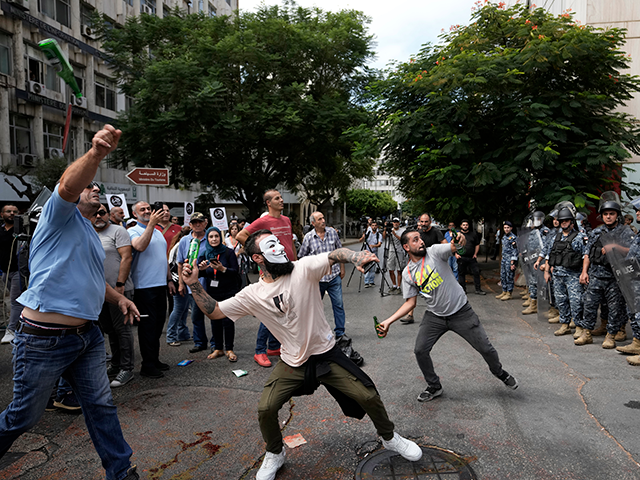Reports this weekend indicated that Lebanese citizens are increasingly turning to sit-in blockades, and outright armed robbery, to pry their savings out of frozen bank accounts as the national economy continues its trajectory toward total collapse.
National Public Radio (NPR) on Saturday noted three incidents of armed Lebanese storming banks to demand their savings during a single week in September. One of them, a man named Abed Soubra, became something of a local folk hero after taking a bank hostage while crowds of supporters thronged outside, urging him to stand his ground.
Soubra eventually surrendered, but a group calling itself “Cry of the Depositors” quickly appears at the scene of every bank robbery and sit-in, urging the perpetrators not to back down.
“A saver enters the bank, we’re outside. We’re like, ‘Yeah! Do it. Come on!’ We give them some motivation,” explained Cry of the Depositors spokesman Ibrahim Abdallah. Abdallah described himself to NPR as a millionaire real estate tycoon who can no longer afford to eat dinner at restaurants because all of his money is frozen.
Some of Lebanon’s desperate bank robbers have employed toy guns, and a few have succeeded in getting a portion of their funds from the bank, although they were arrested soon afterward. To date, no one has been injured during the robberies, although the security forces protecting the banks are increasingly well-armed.
Other Lebanese depositors are leading protests or staging sit-ins to obtain their money, such as 53-year-old Zhara Khaled, who parked her wheelchair in a Tripoli bank and refused to leave until she was given some of her tens of thousands of dollars in frozen savings – money she said she needed to obtain medical treatment. She is wheelchair-bound because she lost one leg to diabetes and is now experiencing ominous pains in the other.
Khaled’s effort was unsuccessful, and she was eventually escorted from the bank by police.
“The bank brought the cops down on us. We’re just demanding our rights! You let us starve!” Khaled’s adult son Ismail shouted as the police led his mother away. Ismail later showed NPR reporters documents that said the family has about $90,000 in their frozen account, including the proceeds of an ill-timed home sale that was completed right before the Lebanese banking system began collapsing.
Lebanese officials admitted some of the hard currency in Lebanon’s banks was spirited out of the country, other funds have been siphoned from bank reserves to pay for government programs, and a good deal of the money is probably gone forever. Depositors are only allowed to withdraw a tiny fraction of their money, officially capped at $500 per month, although some individual banks have even lower limits.
Lebanon’s financial crisis has so many root causes that it is difficult to summarize, but it is essentially a tale of the government borrowing huge amounts of money after a long civil war concluded in 1990 – and then borrowing money to pay off debts, using its credit cards to make credit card payments – until its few sources of stable income were abruptly terminated around 2019, right before the Wuhan coronavirus pandemic rocked the world in 2020.
Vicious sectarian squabbles paralyzed the government, kleptocrats looted what remained in the bank vaults, and the rich Sunni Muslim Gulf states that might have been able to bail out Beirut backed off as the Iran-backed Shiite terrorist organization Hezbollah grew increasingly powerful.
Most observers point to a strange and seemingly peripheral controversy as the straw that broke the camel’s back: a plan to tax voice and video calls made with WhatsApp, to the tune of about $6 per month. The transparently obvious effort to squeeze a little tax revenue from Lebanon’s most popular means of communicating overseas enraged the public, frightened investors, and destroyed what little trust remained in the moribund national government.
The WhatsApp protests were soon followed by the pandemic, the gigantic (and still officially unsolved) explosion that shattered the Port of Beirut in August 2020, and an energy crisis that has made weary Lebanese citizens well-acquainted with rolling blackouts. None of the squabbling factions that control Lebanon is willing to jeopardize its power or money by making concessions that could solve any of the country’s problems. Foreign investors and donors are unwilling to pump funds into the seemingly unreformable Lebanese system.
Last Thursday, a U.S. court decision against Lebanese commercial banks showed some signs of breaking the economic and political stasis enveloping Beirut, or at least giving depositors some hope of clawing their money from the banks.
The ruling concerned a suit brought by a Lebanese family in 2020 against one of the country’s biggest financial institutions, Bank Audi. The plaintiffs filed a breach of contract suit at New York’s Supreme Court after Bank Audi refused to transfer their funds out of Lebanon.
Bank Audi was able to get the suit dismissed by arguing that only Lebanese courts should have jurisdiction, but on Sunday the appeals court reversed that decision and allowed the suit to move forward in the United States.
The family’s legal team said the appeals decision “made history” and would allow “real action” against Lebanese banks to begin, while Bank Audi’s lawyers said they would pursue other “grounds for dismissal.”
“The fact that foreign courts are establishing jurisdiction over cases against Lebanese banks is a very positive step for depositors because the ruling class has paralyzed Lebanese justice,” Fouad Debs, co-founder of the Lebanese Depositors Union, said on Sunday.
“The Lebanese judiciary is not taking the depositors’ issue seriously: most of our cases have not even been ruled on, because of the ongoing strikes, but also for political reasons to protect banks and bankers,” Debs said.

COMMENTS
Please let us know if you're having issues with commenting.